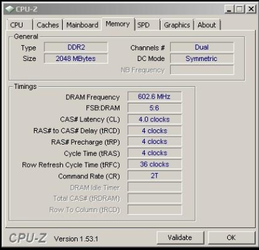Not always. My Crucial Ballistix LV LP kit has much tighter timings in XMP than SPD. Tighter means less strict, or less margin for overclocking, How is "less leeway" "less strict"? Strict is, IMO, a poor word choice. Timings are all very strict, the ram is rated at THAT timing and none other. In...

www.overclockers.com
JEDEC timings are a set of timings, including frequency, that a RAM chip can say "YES, I DO
EXACTLY THIS", and a motherboard can say "LOL ME TOO", and a memory controller can say "HELL YES I CAN DO THAT TOO!" and then they all work happily, guaranteed. Regardless of platform. Regardless of RAM. Any combination.
It has absolutely nothing to do with how fast the chip
can go, or how fast it's
built to go, it's simply a known-good profile that
everything can do.
There are RAM chips rated for speeds that AMD PhII IMCs cannot even come close to touching, but the RAM is
designed for and rated for. (like, anything >1600-1866MHz)
To call itself DDR3, memory MUST be capable of running at least one JEDEC spec frequency/timing set
at 1.5v. That includes LV memory, if it's not 1.5v tolerant it cannot call itself DDR3.
That include ICs
built for 1.8 to 1.9v (D9GTR), they MUST be capable of running a JEDEC profile at 1.5v to call themselves DDR3.
It can be built for more voltage, it can be built for less voltage, it has to be able to run 1.5v.
It has absolutely nothing to do with that the chip is
actually built to do.
A car related example is the Skyline GTR motor.
Japanese "regulations" limit it to 280HP, that's the JEDEC spec.
A chip, nothing but a chip, and you have >500HP. That's what it is actually
built to do.
On a vaguely related note, if Micron designs the chip, Micron makes the chip, Micron rates the chip, Micron solders the chip to a RAM PCB, Micron tests the stick, Micron rates the stick, Micron certifies the stick, and then Micron sells the stick, how can it be "overclocked"?
(Micron owns Crucial. Crucial is, essentially, Micron's storefront)


